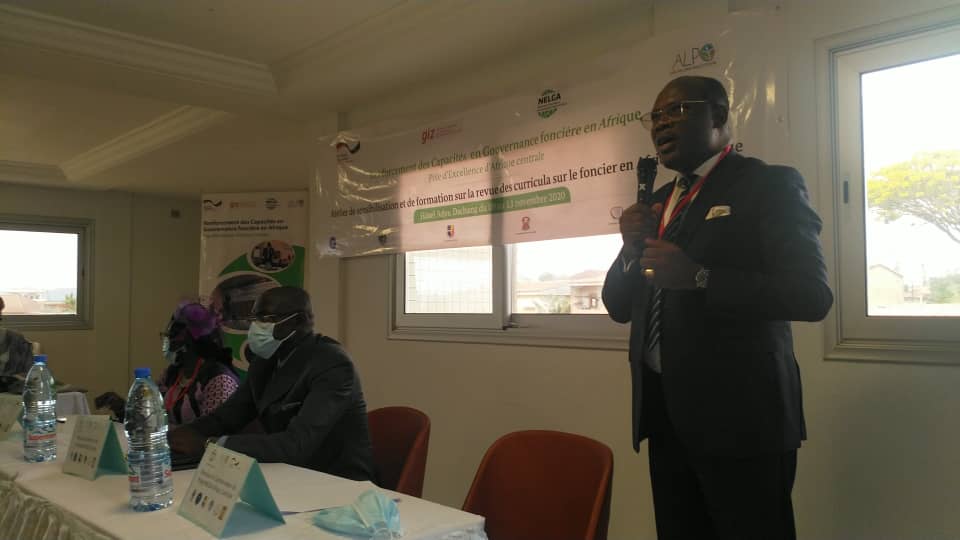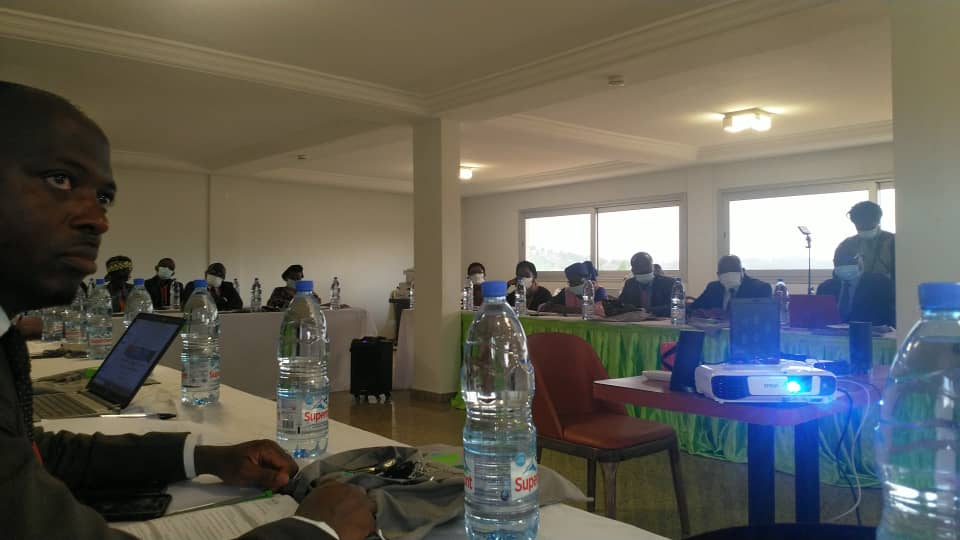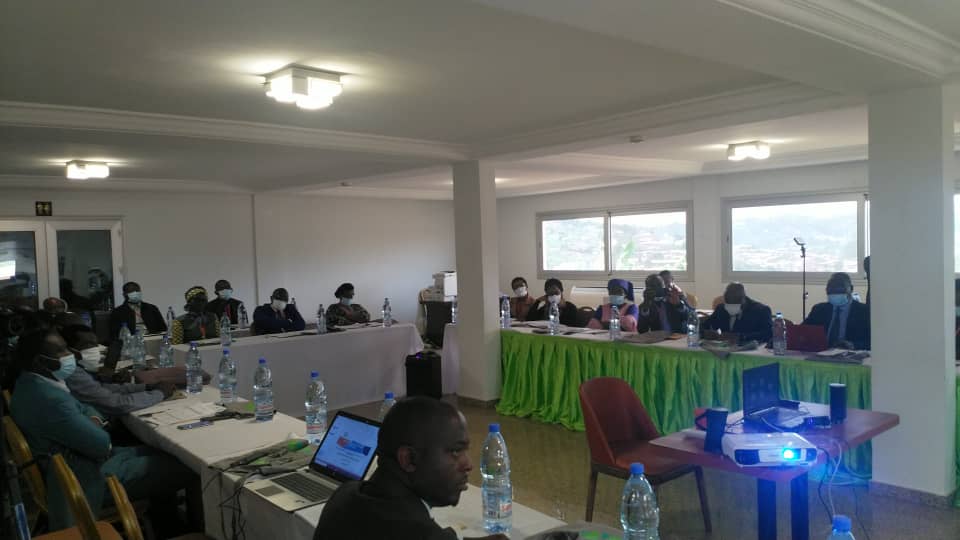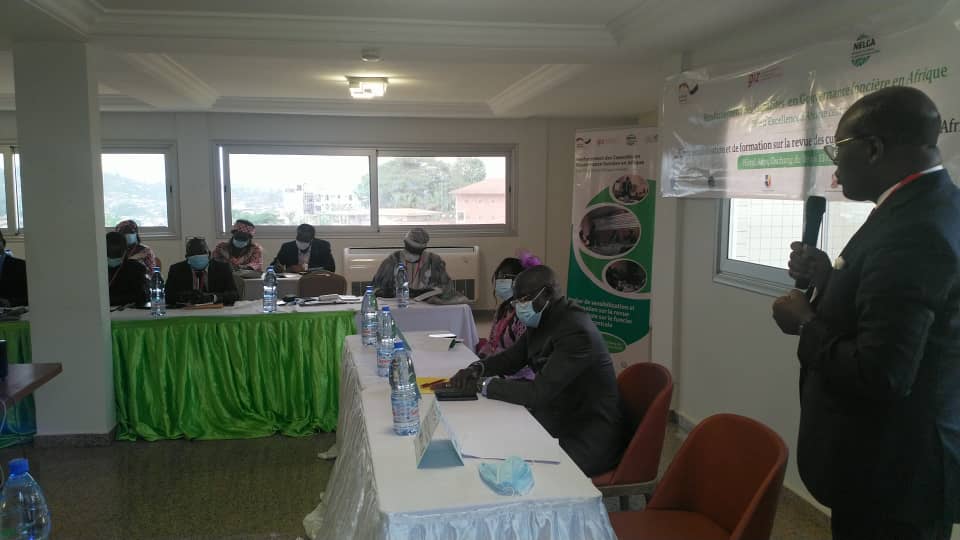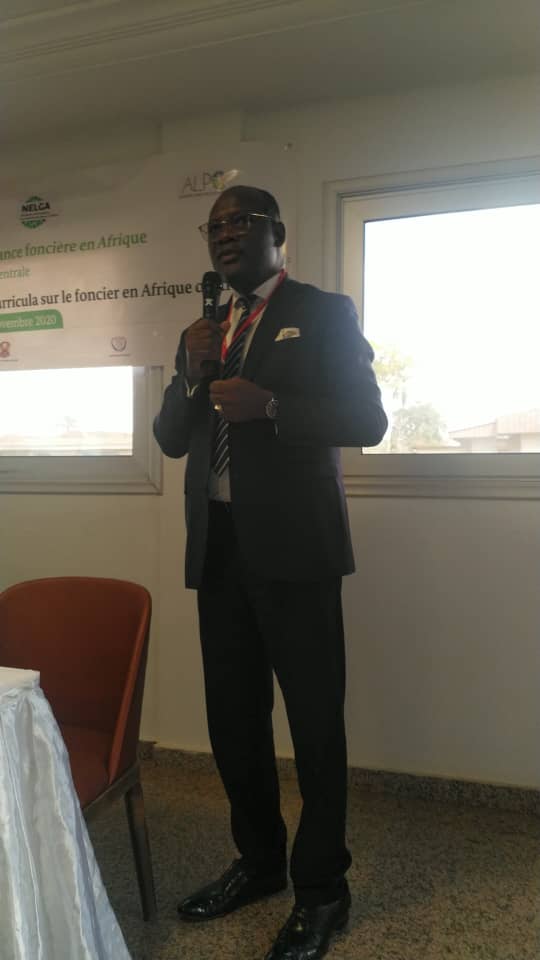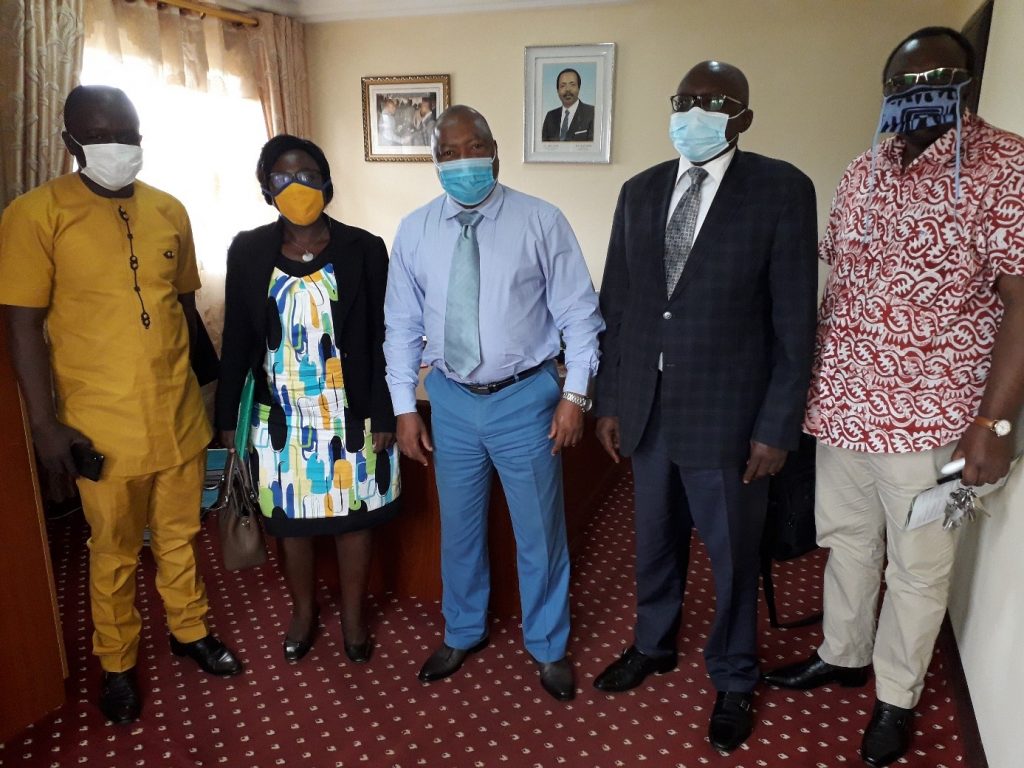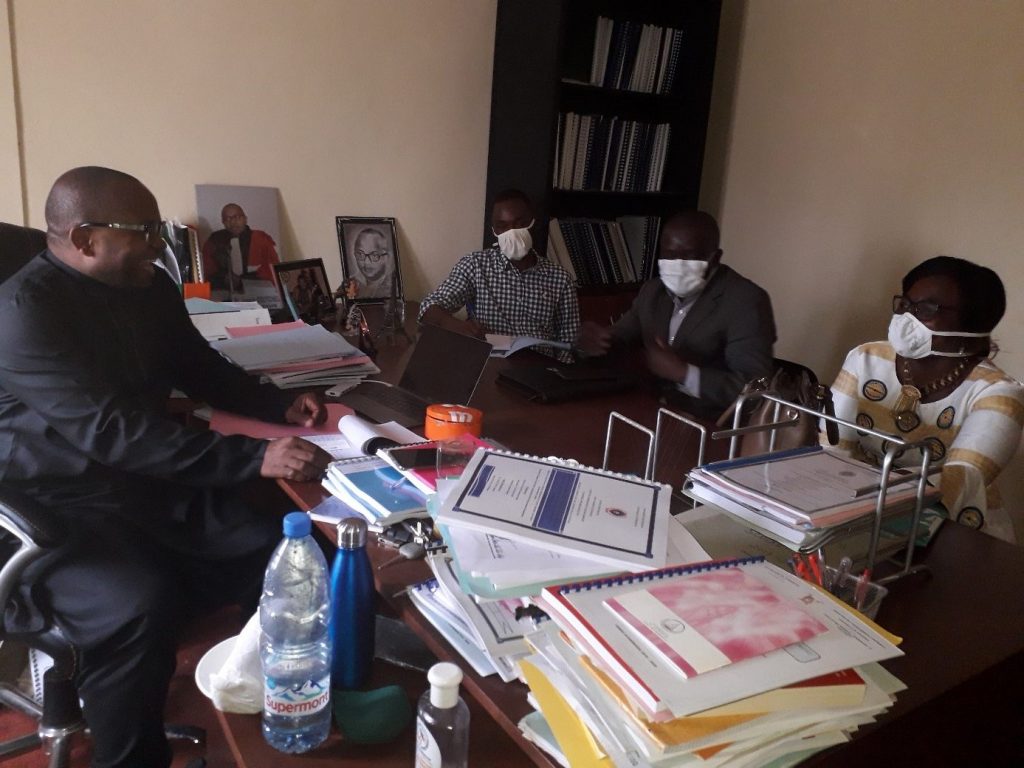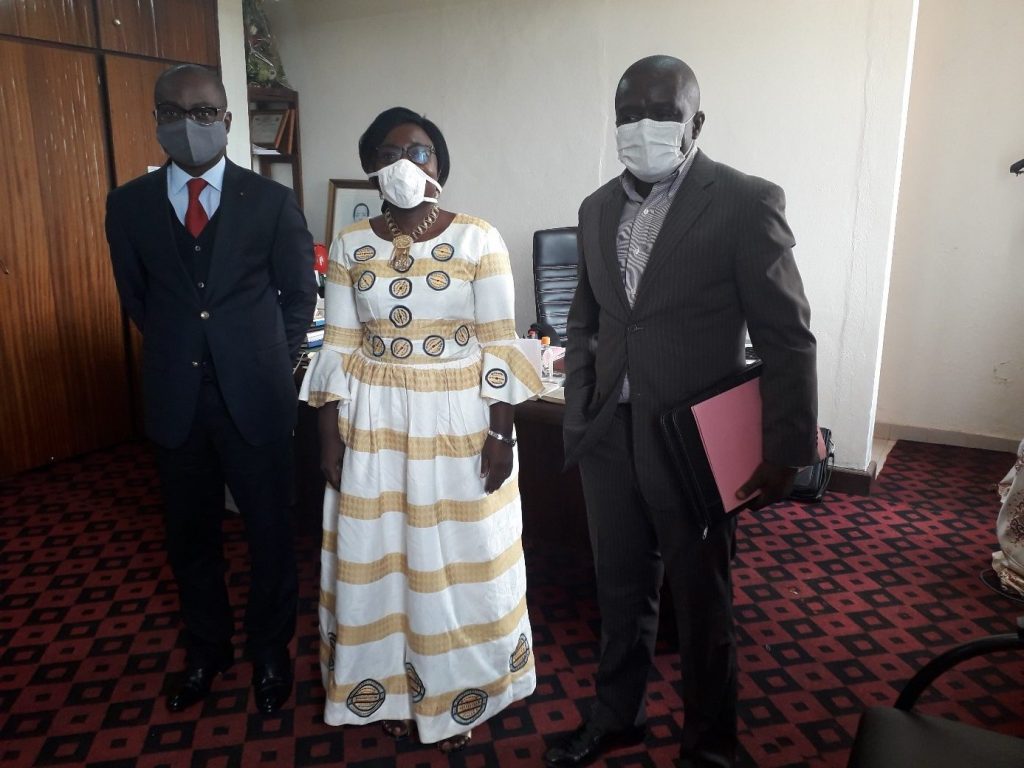Category: Uncategorized
Leading Universities in Central Africa Host Sensitization Workshop on the Guidelines for Curricula Development on Land governance in Africa
Dschang, Cameroon, November 10, 2020: From November 10 – 13, 2020, land governance experts from various universities and research institutions in Central Africa will meet in Dschang, Cameroon, for a sensitization meeting on the review of existing land governance curricula by adopting the recommendations in the Guidelines for Curricula Development on Land Governance in Africa.
The meeting is convened by the Network of Excellence on Land Governance in Africa (NELGA) in partnership with leading universities in Central Africa under the African Land Policy Center (ALPC) coordination with the support of the German Federal Ministry for Economic Cooperation and Development (BMZ) at the African Union. The Guidelines for the Development of Curricula on Land Governance in Africa were endorsed by the AU Conference of the Specialized Technical Committee (STC) on Agriculture, Rural Development, Water and Environment IN October 2017. The Guidelines support the implementation of the African Union (AU) Agenda on Land; and responds to the call for AU Member countries to bridge capacity gaps on land policy development and its implementation.
Given the shortfall in Africa’s land sector, particularly in terms of skills and expertise, African Union member states were asked to “develop adequate human, financial and technical capacities to support the development and implementation of land policy in Africa”. Universities and higher education institutions were then recommended to review existing curricula, research, and training to ensure that they are adequate to meet the industry’s needs. Significant gaps have been identified in the content and nature of African universities and other higher education institutions’ training and research programmes.
Speaking about the workshop, Dr. Joan Kagwanja, ALPC Chief, commented, “In producing the Guidelines, ALPC embarked on extensive consultation and documentation, informed by evidence and data processed by the Center through its rigorous regional assessment reports. The process identified capacity development gaps in land administration and curricula to advance land governance in Africa, which influenced the development of the Guidelines. The Guidelines aim to serve as a framework for the development and/or review of African universities’ academic curricula. These guidelines were presented to the relevant AU political body for approval and are now key tools for implementing the AU’s land agenda.
The sensitization workshop is part of the ongoing advocacy and consultation with academics for mainstreaming land governance capacity gaps across Africa. It is expected that participants will respond to the new proposals and ideas emerging from the Guidelines.”
Prof. Paul Tchawa, the NELGA Central Africa Node Coordinator, explained, “The main objective of this workshop is to raise awareness and equip the leaders of Cameroonian and Central Africa universities who want to engage in the review of their curricula to bring them to speed with the African Union’s guidelines in this area. We welcome the opportunity to close capacity gaps in the land governance curricula as it ensures that as academic institutions, we continue to meet our students’ needs and fulfill the African Union’s mandate.”
At the end of this workshop, participants from partner universities will be made aware of the guidelines for the revision of curricula on land governance in Africa and their contribution to implementing the land policy designed by the AU. They will also understand the procedures to be followed in the review of curricula and design an action plan for the review and design of curricula in their various universities.”
Commending the initiative, Professor Roger Tsafack Nanfosso, Rector of Dschang University, said, “Given the dense and diverse profiles of experts from diverse backgrounds at this workshop, there is no doubt that the workshop will lead to fruitful results and realistic recommendations that can redirect our training offerings towards specific development goals. The reconfiguration of land governance curricula is essential to make land a real lever for economic growth in our continent.”
Participating universities include Universite de Yaounde, Universite de Banqui, Universite Marien Ngouabi, Universite de N’Djamena, Universite Omar Bongo, and Universite de Kinshasha. Universities of Dschang, Douala, Yaounde,Cameroon, and Omar Bongo in Gabon have signified interest to begin revising the content of courses on land after the workshop.
Find below the report and presentations made at the workshop:
The African Land Policy Centre (ALPC), formerly called the Land Policy Initiative (LPI), is a joint programme of the tripartite consortium consisting of the African Union Commission (AUC), the African Development Bank (AfDB) , and United Nations Economic Commission for Africa (ECA). Its purpose is to enable the use of land to lend impetus to the process of African development. The programme is governed by a Steering Committee that meets periodically, while a joint secretariat implements day to day activities.
To strengthen human and institutional capacities for implementing the AU agenda on land, ALPC established the Network of Excellence on Land Governance in Africa (NELGA). NELGA is a partnership of leading African universities and research institutions with proven leadership in education, training, and research on land governance. Currently, NELGA has more than 50 partner institutions across Africa. NELGA aims to: enhance training opportunities and curricula on land governance in Africa; promote demand driven research on land policy issues; connect scholars and researchers across Africa through academic networks; and create data and information for monitoring and evaluation on land policy reforms.
Nazi-Boni University Takes Steps to Establish a Land Governance Master’s Program
In partnership with Nazi-Boni University, NELGA participates in a Curricula Review Workshop in Burkina Faso from November 3 to 6, 2020, intending to establish a master’s degree in land governance.
The workshop brings together experts and leading professors in the region to meet the African Union land agenda, which places research and the implementation of appropriate academic studies and training to bridge capacity gaps on land governance in African universities. NELGA’s participation is under the coordination of the African Land Policy Center (ALPC) with the support of the German Federal Ministry for Economic Cooperation and Development (BMZ) at the African Union.
Universite Gaston Berget in Senegal and Université des sciences juridiques et politiques in Mali held similar exercises with NELGA support. Nazi-Boni University hopes that at the end of the workshop, they will emerge with a training model on land tenure, taking into account the orientations and recommendations in the AU framework and guidelines on land tenure policies.
Pour une amélioration des curricula sur la gouvernance foncière en Afrique Centrale: NELGA Afrique centrale organise un atelier de sensibilisation sur la révision des programmes d’enseignement en matière de gouvernance foncière
Du 10 au 13 novembre 2020, des experts en gouvernance foncière et des universitaires issus des principales universités et institutions académiques du Cameroun se réuniront dans la ville universitaire de Dschang pour examiner la nécessité de disposer des curricula actualisés sur la gouvernance foncière qui tienne compte du contexte africain et qui soit en étroite ligne avec les recommandations de l’Union Africaine en matière de gouvernance foncière.
La réunion est organisée par le Réseau d’excellence sur la gouvernance foncière en Afrique (NELGA), qui est coordonné par le Centre africain de politique foncière (ALPC) avec le soutien du ministère fédéral allemand de la coopération économique et du développement (BMZ) auprès de l’Union africaine, sur le thème “Lignes directrices pour l’élaboration des curricula sur la gouvernance foncière en Afrique”.
La réunion est la résultante de la volonté de universités partenaires à NELGA Afrique centrale d’obtenir un soutien et des conseils dans la révision et la conception des programmes d’études sur les questions de gouvernance foncière. Il est alors nécessaire de sensibiliser ces universités sur les directives conçues par l’Union Africaine en matière de révision des curricula afin d’aligner les programmes d’enseignement sur les politiques stratégiques de l’Union africaine.
L’Université de Yaoundé I via le réseau NELGA en étroite collaboration avec ses universités partenaires ont envisagé le présent atelier de sensibilisation/formation afin de doter les responsables universitaires d’Afrique centrale des outils et connaissances nécessaires à la révision de leurs programmes d’études sur le foncier tout en s’assurant de la conformité de ces programmes avec les lignes directrices de l’Union africaine.
La gouvernance foncière est associée à la gestion de plusieurs autres ressources connexes qui pourraient propulser la croissance économique, la prospérité et le développement durable à grande échelle, d’une part, et les activités culturelles, d’autre part. La terre joue également un rôle prédominant dans la cohésion sociale, la paix et la sécurité.
Compte tenu du déficit observé dans le secteur du foncier en Afrique, notamment en matière de compétences et d’expertise, les États membres de l’Union Africaine ont été invités à “développer des capacités humaines, financières et techniques adéquates pour soutenir l’élaboration et la mise en Å“uvre de la politique foncière en Afrique”. Il a alors été recommandé aux universités et établissements d’enseignement supérieur d’examiner les programmes d’études, de recherche et de formation existants afin de déterminer s’ils sont adéquats pour répondre aux besoins de l’industrie. Des lacunes importantes ont été identifiées dans le contenu et la nature des programmes de formation et de recherche proposés par les universités et autres établissements d’enseignement supérieur africains.
Face à ce constat, le Centre Africain sur les Politiques foncières (ALPC – African Land Policy Centre) a élaboré en partenariat avec un groupe d’experts et d’académiciens africains les « lignes directrices pour le développement de programmes d’études sur la gouvernance foncière en Afrique ». Ce document a pour objectif de servir de cadre pour le développement et/ou la revue des curricula académiques des universités Africaines. Ces lignes directrices ont été présentées à l’organe politique compétent de l’UA pour approbation et sont ensuite devenu l’un des outils clefs de la mise en Å“uvre de l’agenda de l’UA sur le foncier.
À la fin de l’atelier, les universités de Dschang, Douala, Yaoundé, Cameroun, Université de Bangui en RCA, l’Université de N’Djamena au Tchad et Omar Bongo au Gabon commenceront à réviser le contenu des cours sur le foncier.
Integration of Land Tenure Issues into the Revised Rural Sectarian Development Strategy and the National Agricultural Investment Plan (SDSR/PNIA) in Cameroun
From September 9th to 10th, 2020, the Government of Cameroon, with the support of FAO and other partners, convened a multi-sectoral workshop to review, validate, and appropriate the Rural Sectarian Development Strategy and the National Agricultural Investment Plan (SDSR/PNIA) for 2020-2030, in Yaounde, Cameroon.
Since 2019, Cameroon has committed to making the rural sector one of the critical sectors contributing to its development. The SDSR/PNIA serves as the benchmark and framework for developing and investing in Cameroon’s rural areas. The policy documents play an integral part in the country’s commitment to the Malabo Declaration.
The meeting heard opening remarks from FAO Representative on behalf of the Technical and Financial Partners (PTFs) for the development of the rural sector; a representative of the African Union (AU); and a keynote address by the Minister of Agriculture and Rural Development that was followed by a brief presentation of the SDSR/PNIA 2020-2030 by the Coordinator of the Technical Secretariat of the SDSR/PNIA.
The SDSR/PNIA strategic directions consist of four main axes: 1) sustainable growth in production in the plant and forestry sectors, animal and fishing; 2) improving the collective infrastructure environment and access to factors of production; 3) strengthening the resilience of production systems, sustainable management of natural resources and food and nutrition security of vulnerable populations in the face of climate change; 4) Improving governance and human capital in the sector.
GIZ, through the Strengthening Advisory Capacities for Land Governance in Africa Program, carried out a study on the evaluation of land governance in Cameroon to make a significant contribution to the revision process of the SDSR/PNIA.
The Results of this study were submitted to the Technical Secretariat in charge of coordinating the review process. During the validation workshop, it was observed with great satisfaction that most of the actions and recommendations concerning land tenure were considered in the revised version of the SDRS/PNIA document.
These main actions and recommendations are the following:
- Involve decentralized local authorities, local communities, and indigenous peoples in the review process and implementation of the new PNIA.
- Finalize the implementation of land reforms that consider women’s rights, young people and indigenous people to land, and the adoption of relevant compensation systems.
- Finalize the implementation of forest reform, taking into account the guidelines of land reforms on securing rights, improving regulations on the sustainability of exploitation in the DFNP (Non-permanent forest estate), taking into account emerging factors such as climate change and other unpredictable social phenomena, internal displacement, and others.
- Finalize the implementation of the pastoral code with consideration for the sustainability of operating systems, securing rights and arbitration of conflicts;
- The Law Framework on Environmental Management should be updated with allowances made for the sustainability of production systems, the vulnerability related to unpredictable social or natural phenomena, and international commitments to sustainable management sectors.
- Promoting the implementation of community consultation platforms for all initiatives.
- Institutionalization of independent land observation that will serve as collective vigilance.
- Digitization of the land registry and sharing information /communication on land operations.
- Monitoring and evaluating land governance issues by the Rural Sector Monitoring Committee (COS) and Strengthening COS in monitoring land governance issues.
- Support for mapping communities and promoting innovative approaches to community security (participatory mapping, mapping of community land rights, etc.).
- Awareness and information on land operations and the implementation of major development projects.
- Protection of watercourses and watersheds.
- Sensitization and accompaniment of women, youth and IPs in accessing land for agriculture.
Participants at the workshop include representatives from technical committees on SDSR, rural departmental programs, and ministries, civil society space, National Youth Council, the Chamber of Agriculture, Fisheries, Livestock and Forestry, including some regional representatives; the private sector, universities, other public administrative institutions, consumer unions, and SDSR/PNIA Technical Secretariat. The applauded the use of the multi-sector approach for policy reviews and recommended that such actions be strengthened for ongoing sector policy development and review processes.
Following this meeting, the validated document will be shared with AUDA-NEPAD for an independent external technical journal. Subsequently, a bilingual edition of the SDSR/PNIA 2020-2030 document will be publicized and a business meeting scheduled to discuss stakeholders’ financial commitments towards implementing the SDSR/PNIA 2020-2030 plan.
Click the link below to read the full report of the study on evaluation of land governance in Cameroon.
NELGA Southern Africa Hub to hold Research and Capacity Development Workshop on Land Governance Innovation in Southern Africa
From October 6th – 8th, 2020, the Network of Excellence on Land Governance in Africa Southern Africa hub at the Namibia University of Science and Technology (NUST) will hold a virtual workshop to present its final draft of the Research and Capacity Development Strategy for Land Governance Innovation in Southern Africa. When adopted, the strategy serves as the basis for future research and capacity building in land governance innovation within the Southern African region.
The strategy document stems from the regional hub’s research on land governance in Southern Africa, which covers the description and assessment of Land Governance in the region. The countries covered include Botswana, Lesotho, Malawi, Namibia, South Africa, Eswatini, Zambia, and Zimbabwe. The eight-country assessment results were presented at the NUST-NELGA Hub for Southern Africa at a 2-day Symposium in 2019. The Symposium identified regional land policy implications and the key land challenges facing Southern African countries. The key challenges and opportunities were published in a Synthesis Report in 2020. The eight country case studies and the synthesis report will form the basis for future research, capacity development, and policy innovation in the region.
Ensuring that recommendations published in the Synthesis Report are carried out systematically, NUST-NELGA Hub developed the “Research and Capacity Development Strategy for Land Governance Innovation in Southern Africa” for the period 2020 to 2025.
The strategic initiatives outlined in the Research and Capacity Development Strategy for Land Governance Innovation in southern Africa are closely aligned with the prominent African and International Initiatives. The strategy supports and draws inspiration from the African Land Policy Initiative and the Framework and Guidelines on Land Policy in Africa as well as the African Agenda 2063, the UN 2030 Agenda for Sustainable Development (SDGs), the FAO Voluntary Guidelines on Responsible Governance of Tenure (VGGTs) and the World Bank Land Governance Assessment Framework (LGAF).
The meeting will have in attendance, civil society actors, policymakers, academics, and researchers from the region and across the continent.
For inquiries, contact nelga@nust.na
The African Journal on Land Policy and Geospatial Sciences Listed in ERIH PLUS
NELGA is pleased to announce that its periodical, the African Journal on Land Policy and Geospatial Sciences (AJLP&GS), is now approved for inclusion in the European Reference Index for the Humanities and Social Sciences (ERIH PLUS), one of the most prominent authority lists in Europe for academic Journals.
ERIH Plus’s key objective is it improves the global visibility of hg-quality academic research, and It is expected that with this inclusion, it will increase the visibility, searchability, and availability of the AJLP&GS to wider stakeholders.
This inclusion reflects the high quality of the academic research found in the AGJLP&GS, and will significantly expand land governance experts’ access to vital studies for further research and case studies.
AJLP & GS is a journal specialized in publishing research activities carried out in geospatial sciences and land governance. It aims to encourage innovation, promote the exchange of knowledge and scientific outcomes related to its themes. The Journal’s target community is made up of researchers, professors, and professionals working in the newspaper field. The Journal also aims to promote scientific articles and productions at the African, regional, and global levels.
The inclusion speaks to the rigorous standards met by the researchers, editorial team, and peer reviews to be accepted into the EEIH SPSS.
You can find the listing here: https://dbh.nsd.uib.no/publiseringskanaler/erihplus/periodical/info?id=499477
This is one in many other accrued successes by the Journal, which includes adding an ICDS score of 3.3 for 2020 from the University of Barcelona as one of the best references for scientists and researchers: http://miar.ub.edu/issn/2657-2664. The AgEcon Search added the Journal to its repository as one of the best concerns for scientists and researchers: https://ageconsearch.umn.edu/search?ln=en&cc=2367&p=&f=&action_search=Search. The UNIVERSITÄT LEIPZIG also included the Journal in its database: https://www.ub.uni-leipzig.de/en/research/electronic-journals/ezb-detail-view/?libconnect%5Bjourid%5D=461537, and also integrated into the ZDB Germain union catalog: https://zdb-katalog.de/list.xhtml?t=zdb%3D3002625-8&key=cql
To access the journal, click here.
NELGA CA Successfully Completes Mission Visit to the University of Douala, Cameroon
From September 3 to 9, 2020, the NELGA Central Africa team completed a mission trip to the University of Douala, Cameroon, to discuss opportunities for partnership between the school and the network. The team held several meetings and interviews with faculty, staff, and students from the land-themed departments. These interviews serve as a follow-up exercise to ascertain the university’s interest in becoming a member of the African Network, allowing the team to gather information and final evaluation.
Both school administrators and faculty staff complimented the professionalism and level of engagement of the NELGA CA team. They applauded their passion for closing capacity gaps around land reforms and governance through engaging the academic sector. The school was enthusiastic and supportive of the scholarship plans, networking opportunities and proffered new areas for research and curricula development on land themed issues, such as a land dispute, gender and access to land, and land tenure in Cameroon. The school expressed its willingness to partner with NELGA.
NELGA CA is currently exploring new collaboration and partnerships with state universities in Cameroon to increases its footprint in the region. The NELGA Douala mission was coordinated by Prof. Paul Tchawa and implemented by Mme Rosette Mbenda and Dr. Tende Renz.
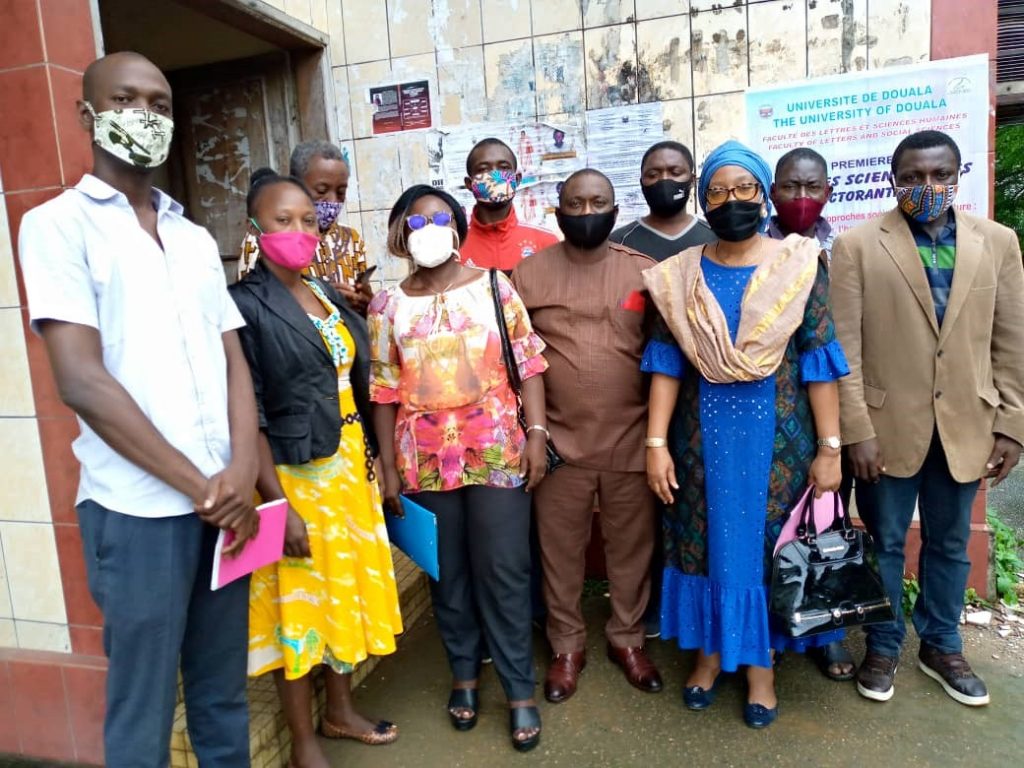
Land Tenure Insecurity and Urbanization in Benin – NELGA Land Register Francophone West Africa
In Benin, the issue of land tenure insecurity and the instability of land rights in urban, peri-urban, and rural areas draws its source from the increasing pressure exercised by different categories of land stakeholders in their search for space for the development of their economic, social and cultural activities.
Consequently, the exercise of land rights remains low and does not stimulate appropriate enthusiasm by land stakeholders to turn land into productive investments for sustainable development and economic growth. Added to this situation is the virtual control exercised by families and communities on the agricultural land considered (rightly or wrongly) as goods inherited from their ancestors and, therefore, belonging to them. Often this preeminence of customary rights ancestral constitutes a brake on the implementation of agricultural development policies. While traditional rights include a variant of the rural land issue not negligible, it remains that the lack of supervision and better regulations annihilate the efforts made by the public authorities in reviving the agricultural sector.
This report from NELGA Francophone West Africa node, provides a case study for Benin republic with provisions for land reforms for land tenure security.
Registration is now OPEN: Africa Land Forum 2020
The Africa Land Forum is a continental event organised annually by the International Land Coalition (ILC) Africa and its partners to reflect on, and recommend solutions to, burning land governance issues and challenges in the continent. It provides a platform for policymakers, community representatives, development practitioners and partners to devise novel ways of making land governance people-centred. ILC draws from its rich and diverse membership and partners to mobilise integrated stakeholders to join the Land Forum.
The 2020 Land Forum is organised in partnership with IGAD’s Land Governance Unit, and the Department of Rural Economy and Agriculture (DREA) of the African Union Commission. This event, taking place at a time when every sector is shaken by the Coronavirus (COVID-19) pandemic, offers a golden opportunity to reflect and highlight the pertinent role of land governance in building resilience and protecting Africans from the negative impact of similar pandemics in the future. It also offers an occasion to push the frontiers of thought around the role of land governance in fostering socio-economic development and enabling the attainment of the 2063 aspirations.
The University of Dschang, Cameroon, Express Interest to Join NELGA
The University of Dschang in Cameroon, through its Vice-Rector, Prof. Nyoja Jean has expressed the University’s willingness in future collaborations with the Network of Excellence on Land Governance in Africa (NELGA), especially on research projects as related to IDP’s security and land rights in western Cameroon and the collection of land and topographical data.
Prof. Nyoja expressed this during an advocacy meeting on August 17, 2020, with members of the NELGA team, lead by Prof. Leka Amand and Rosette Mbenda, NELGA Regional Advisor for Central Africa, to explore opportunities with the school administrative authorities for future partnership between the institution and NELGA. NELGA intends to expand its current collaborative partners with universities in Cameroon and used the advocacy visit to showcase the impact of NELGA on land governance academic studies and higher institutions in Africa.
The NELGA project in Central Africa, with Prof. Paul Tchawa as Regional Coordinator, officially launched in January 2019 in Yaounde, Cameroon, with the University of Yaounde I serving as the project’s regional node. The University of Yaounde is the only current partner institution in the country. In 2020, it became imperative to expand the reach of land governance academic opportunities and expertise in the country. This necessitated the advocacy visit to the University of Dschang to involve more public higher education and research institutions.
“It was imperative to showcase the impact of NELGA to academic authorities at the University of Dschang and the opportunities that come with NELGA to tackle land issues and land governance for the region and the continent,” explained Rosette Mbenda, NELGA Regional Advisor at the meeting. “The land crisis is a big problem in the continent, hence the adoption of the African Union Framework and Land Policy Directives in Africa validated by different African heads of state as a lever for sustainable development through which NELGA came to fruition.”
During the advocacy visit, the team met with the Secretary-General of the University, , the Dean of FLSH, , Vice-Dean Faculty of Legal and Political Sciences, , Head of The Department of Philo-socio-psychology, Dean of Faculty of agronomic sciences ( FASA)and others.
According to Rosette Mbenda, “We are currently working on the second phase of the NELGA project in Central Africa. We hope that by partnering with the University of Dschang and expanding the number of higher institutions and research organizations in the region, we can increase our voices and footprint to ensure land governance research work supports appropriate data for policy making and good governance.”
Currently, the member countries of the network in Central Africa are in the current state. In addition to Cameroon are Gabon, Central Africa Republic, Congo, Democratic Republic of Congo, and Chad. Actions are considered to integrate Equatorial Guinea into the sheet holder of NELGA Central Africa.
